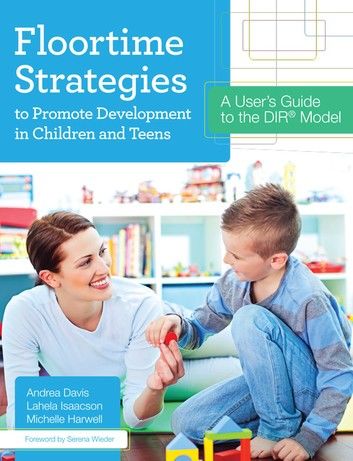| FindBook |
|
有 1 項符合
Michelle M. Davis的圖書 |
 |
$ 865 電子書 | Floortime Strategies to Promote Development in Children and Teens
作者:Andrea Davis,Ph.D.,Michelle Harwell,M.S., Lahela Isaacson,M.S. 出版社:Brookes Publishing 出版日期:2014-08-13 語言:英文  看圖書介紹 看圖書介紹
|
|
|
圖書介紹 - 資料來源:樂天KOBO 評分:
圖書名稱:Floortime Strategies to Promote Development in Children and Teens
Floortime™ is a highly effective intervention approach for children and adolescents with autism and other developmental disorders. Now there’s a step-by-step guide for parents to LEARN and professionals to TEACH the DIRFloortime® model of helping young people with social, emotional, and cognitive challenges.
This guide takes the research-supported developmental approach to treatment and breaks it down into a curriculum of simple, sequenced strategies you can use right away to support the social and cognitive development of children and teens. Quick instructions and examples for each method are laid out for easy viewing in the midst of a play session. Certified DIRFloortime experts explain the theoretical background and the basics of how to play and interact with children in ways that motivate them, make the most of their natural interests, and help them develop critical new social, emotional, and intellectual capacities. Whether you’re a professional or parent, this practical, ready-to-use Floortime™ guide is an essential addition to your intervention toolkit.
WHY USE DIRFloortime?
PRACTICAL MATERIALS: Each DIRFloortime strategy comes with a clear description and enlightening examples of how to apply it in a variety of real-life scenarios. The appendix walks you through 11 effective strategies for helping children and adolescents reduce challenging behaviors.
Help children develop crucial skills:
Regulation and Attention Social Engagement and Attachment Reciprocity Social Problem Solving Self-Awareness Empathy Imagination Emotional Thinking Logical Thinking Complex Thinking Self-Reflection
This guide takes the research-supported developmental approach to treatment and breaks it down into a curriculum of simple, sequenced strategies you can use right away to support the social and cognitive development of children and teens. Quick instructions and examples for each method are laid out for easy viewing in the midst of a play session. Certified DIRFloortime experts explain the theoretical background and the basics of how to play and interact with children in ways that motivate them, make the most of their natural interests, and help them develop critical new social, emotional, and intellectual capacities. Whether you’re a professional or parent, this practical, ready-to-use Floortime™ guide is an essential addition to your intervention toolkit.
WHY USE DIRFloortime?
- Proven effective—research-supported, field tested, and rooted in developmental psychology
- Targets the key cognitive and social-emotional capacities children need to thrive in the real world
- Promotes learning and growth through play and interaction
- Fosters warm, attuned parent-child relationships
- Meets your specific needs—apply DIRFloortime® strategies in developmental order or use them as standalone teaching tools
- Gives you quick catchphrases that make strategies “stick,†so you can use them anytime, anywhere
- Encourages caregiver self-reflection and self-awareness—a key part of helping children and teens develop their own self-reflection skills
- Leads to children and teens becoming joyful, spontaneous, flexible, creative, and empathic human beings
PRACTICAL MATERIALS: Each DIRFloortime strategy comes with a clear description and enlightening examples of how to apply it in a variety of real-life scenarios. The appendix walks you through 11 effective strategies for helping children and adolescents reduce challenging behaviors.
Help children develop crucial skills:
|











